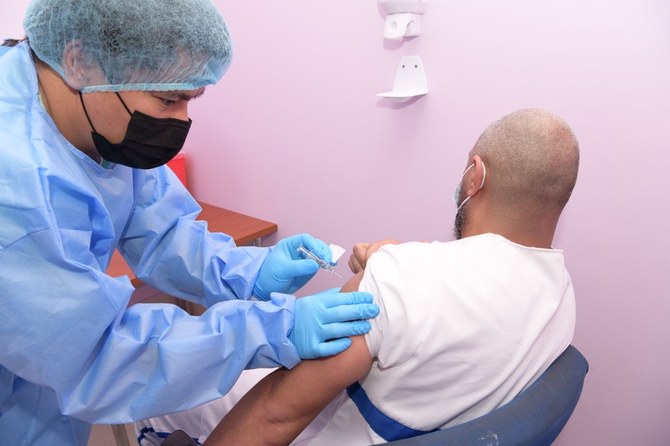DUBAI: Authorities in the UAE on Thursday recorded 3,529 new confirmed cases of COVID-19, the highest daily count to date, and four more deaths related to the disease.
Officials from the Ministry of Health and Prevention said the total number of cases in the country has reached 267,258, while the death toll stands at 766. A total of 239,322 patients have recovered from the disease, including 3,901 in the past 24 hours.
Dubai Economy, the emirate’s economic development authority, said it carried out 140,000 inspection visits last year, as a result of which it issued 2,100 fines and warnings, and closed down 175 businesses for failing to comply with precautionary measures designed to slow the spread of the virus.
.@Dubai_DED carries out 140 thousand inspection visits in 2020 and issuing 2,100 fines and warnings and 175 establishments were closed last year for not complying with precautionary measures. #Dubai pic.twitter.com/DoTmIp4xGU
— Dubai Media Office (@DXBMediaOffice) January 21, 2021
During their latest daily inspection tours, the authority’s officials ordered one business to close, and issued 23 fines and two warnings for not following the health precautions.
Meanwhile Dubai Municipality announced it has stepped up its inspection campaigns. It added that five businesses were ordered to close, 18 were fined, and warnings were issued to 31 for lack of compliance with precautionary measures.
Dubai Tourism said it has issued more than 200 violation notices during the past three weeks and closed down about 20 establishments. It also announced that all previously issued entertainment permits are “on hold, effective immediately,” and added it will continue to evaluate the situation in consultation with the health authorities.
The General Department of Punitive and Correctional Institutions in Dubai Police has started to give the coronavirus vaccine to inmates of penal and correctional institutions, as part of the emirate’s efforts to achieve acquired immunity, according to a report by state news agency WAM.
Inmates at #Dubai’s punitive and correctional institutions receive doses of the Covid-19 vaccine. pic.twitter.com/6dKUcH7kPN
— Dubai Media Office (@DXBMediaOffice) January 21, 2021
Inmates reportedly said they were happy to be vaccinated and praised Dubai Police and medical staff in the prisons for providing them with the vaccinations, medical advice and check ups.
The Zayed Higher Organization for People of Determination, in cooperation with the Abu Dhabi Health Services Company, has launched a campaign to vaccinate people with disabilities, and their families. The effort will begin at the organization’s headquarters in Abu Dhabi, before expanding to Al-Ain and Al-Dhafra regions.
As part of the organization’s efforts, we are providing the Covid-19 vaccine to people of determination and their families aged 16 years and over at the Abu Dhabi Care and Rehabilitation Center ( Gym ).
20 - 25 January 2021
(excluding Friday and Saturday).#TogetherWeRecover pic.twitter.com/9lVJfjGiu5— Zayed Higher Organization مؤسّسة زايد العُليا (@zhoCare) January 21, 2021
Abdullah Abdul Ali Al-Humaidan, the organization’s secretary-general, said that the vaccine is the safest and most effective way to limit the spread of COVID-19 and maintain the health and safety of the public.
Meanwhile, Umm Al-Quwain’s Executive Council informed all government agencies in the emirate that anti-coronavirus measures due to be implemented from Jan. 24 are being amended. The notice said all government employees will be required to take a PCR test every seven days, at their own expense, if they have not received the required two doses of the COVID-19 vaccine. This also applies to outsourced employees and public-service companies.
The council also urged all government agencies in the emirate to encourage their employees and workers to get the vaccination, which is available to everyone free of charge.
Elsewhere, Kuwait reported 570 new cases of COVID-19, raising the total in the country to 159,834. The death toll remains at 951, with no additional deaths reported in the previous 24 hours.
تعلن #وزارة_الصحة عن تأكيد إصابة 570 حالة جديدة، وتسجيل 406 حالة شفاء، ولم تسجل أي حالة وفاة جديدة بـ #فيروس_كورونا_المستجدّ COVID-19 ، ليصبح إجمالي عدد الحالات 159,834 حالة pic.twitter.com/02V3HNaM6D
— وزارة الصحة - الكويت (@KUWAIT_MOH) January 21, 2021
Oman’s health ministry confirmed 169 new cases and one additional death, bringing the national totals to 132,486 and 1,517, respectively.
بيان رقم 272
21 يناير 2021 #عمان_تواجه_كورونا pic.twitter.com/FX0CWzwD3U— وزارة الصحة - عُمان (@OmaniMOH) January 21, 2021
In Bahrain the death toll stands at 366 after no new deaths were reported. The number of confirmed cases in the country increased by 305.
Out of 12310 COVID-19 tests carried out on 21 January 2021, 305 new cases have been detected among 137 expatriate workers, 158 new cases are contacts of active cases, and 10 are travel related. There were 354 recoveries from #COVID19, increasing total recoveries to 95594 pic.twitter.com/3mVv4bk0sn
— وزارة الصحة | مملكة البحرين (@MOH_Bahrain) January 21, 2021




























